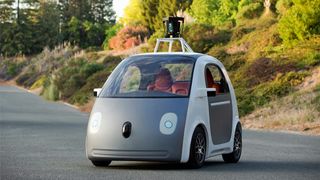Driverless car invasion forces change to the UK Highway Code
Robocars to be unleashed

Google's new self-driving cars could be unleashed on UK roads thanks to plans to change the Highway Code.
Existing laws don't allow for the vehicle, which has no steering wheel or any other driver controls.
UK science minister David Willets says the current Highway Code is inadequate for coping with the new technology, but he emphasised the move isn't aimed specifically at allowing Google's technology on UK roads.
Instead, it's about supporting the development of competing UK technology.
"There is British technology, and it's a lot cheaper than the Google technology," Willets told the Daily Mail. 'We are one of the world leaders in this.'
"But whereas the Google car, they have notched up more miles, so we have got to ensure that the British has its own opportunity to get tested in a wider range of environments and that's what we are working on with the department for transport."
Willets is speaking chiefly of work being done at Oxford university into relatively cheap bolt-on tech to enable driverless operation of cars. Currently, it's claimed the prototype system costs around £5,000 and will eventually whittled down to just £100.
Get daily insight, inspiration and deals in your inbox
Get the hottest deals available in your inbox plus news, reviews, opinion, analysis and more from the TechRadar team.
Lack of controls
One key stumbling block is a lack of controls. Existing regulations in the US that have allowed Google's previous driverless cars to be tested on public roads stipulate that a human driver be present in the driver's seat at all times.
Clearly no controls means no driver's seat. California's Department of Motor Vehicles is expected to tweak it's regulations to allow for Google's latest development, which entirely lacks controls for human drivers. And Willets says it's important for the UK to keep up.
'Certainly there are new regulations being drafted in California and obviously this is something I have discussed with the Department for Transport, we are aware of it. We need to work on these type of regulations so that as the technology develops in Oxford and elsewhere we can see them used,' says Willets.
Overall, we're very pleased to see the UK government taking a progress stance on driverless cars. Our view is that the technology will be a huge net benefit to quality of life on several fronts.
While public acceptance of driverless tech is currently patchy, we reckon attitudes will rapidly turn around once fuller appreciation of the huge benefits become clear and once early prototypes have proven their safety prowess.
If the UK can be at the vanguard, then there's a good chance we'll also reap the huge economic benefits of selling our driverless echnology around the world.
Technology and cars. Increasingly the twain shall meet. Which is handy, because Jeremy (Twitter) is addicted to both. Long-time tech journalist, former editor of iCar magazine and incumbent car guru for T3 magazine, Jeremy reckons in-car technology is about to go thermonuclear. No, not exploding cars. That would be silly. And dangerous. But rather an explosive period of unprecedented innovation. Enjoy the ride.

Amazon Prime Video's disappearing act could point to a future without the service

Tesla Cybertruck suffers new recall for a very scary problem

'The party is over for developers looking for AI freebies' — Google terminates Gemini API free access within months amidst rumors that it could charge for AI search queries